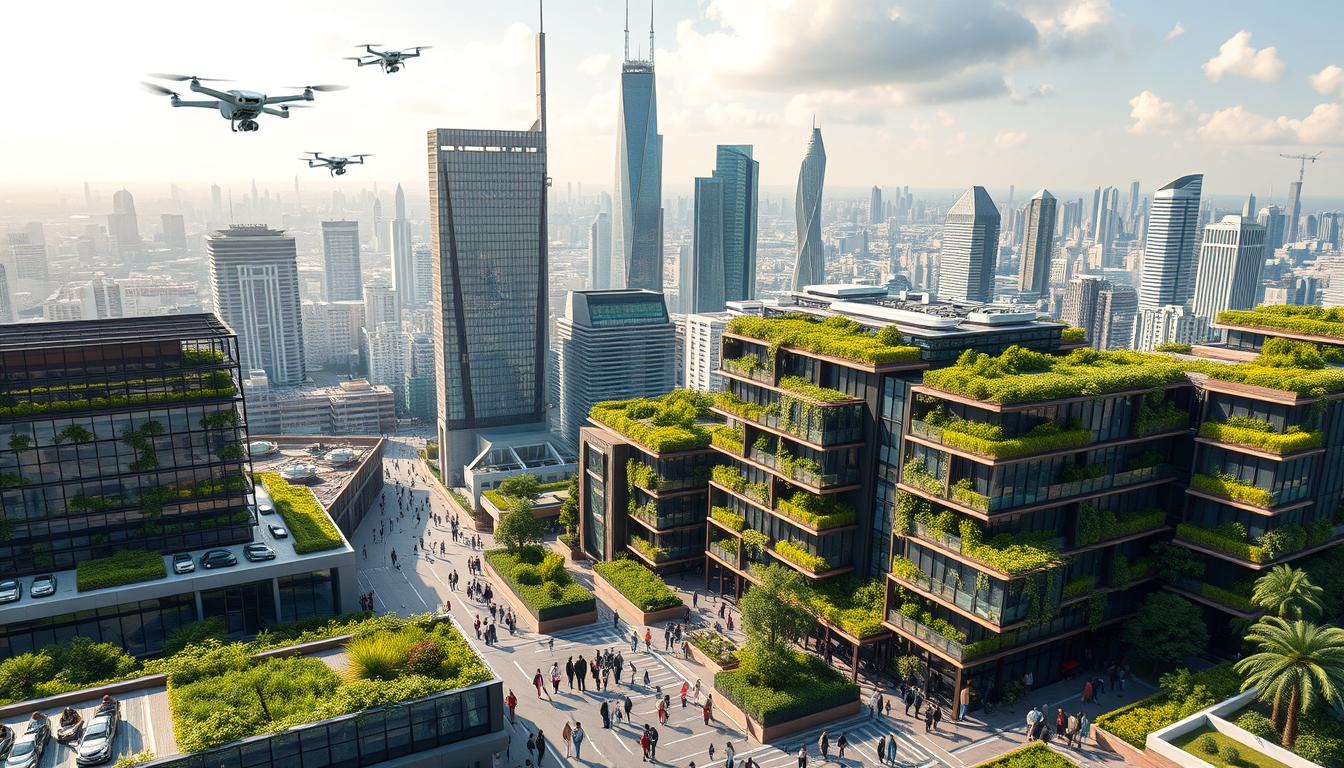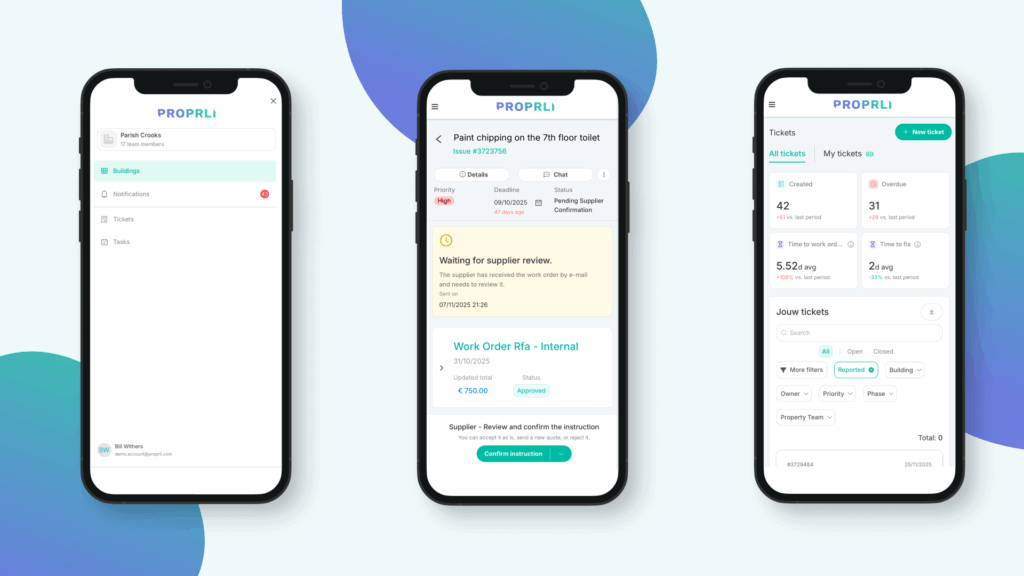The property management sector is undergoing a significant transformation, driven by technological advancements and innovative strategies. Looking ahead to 2025, several pivotal trends are set to redefine commercial real estate management. These changes promise to enhance efficiency, reduce costs, and streamline operations.
Cloud-based systems and AI-driven automation are at the forefront of these changes. There’s also a growing emphasis on sustainability and advanced analytics. The rapid evolution of the industry demands that investors, developers, and professionals stay abreast of these developments to remain competitive.
This article delves into the most impactful property management trends for 2025. These shifts will significantly alter the commercial real estate management landscape. For property owners, investors, and managers, grasping these trends is essential. It will enable them to adapt to the evolving market and secure their success in the future.
Key Takeaways
- Cloud-based systems and AI-driven automation will streamline property management operations
- Sustainability initiatives and energy efficiency will become top priorities for property managers
- Advanced reporting and data analytics will enable smarter decision-making
- Virtual reality tours and smart home technology will enhance the tenant experience
- Flexibility and adaptability will be key to navigating regulatory changes and shifting workforce dynamics
The Impact of AI and Automation on Property Management
Artificial intelligence (AI) and automation are transforming the property management sector, enhancing efficiency and simplifying processes. AI-driven automation is now a key component in property management, allowing managers to base decisions on data and minimize errors. AI systems analyze past data to forecast inventory requirements, thus avoiding overstocking or understocking.
Predictive analytics are essential for smart inventory classification, aiding property managers in tracking and managing items across various properties. Automated reordering systems guarantee that vital supplies are consistently available, lowering the chance of shortages and boosting efficiency.
The use of AI in real estate is increasing, with 14% of companies already employing AI and 23% testing its use. AI’s capacity to analyze vast amounts of data in real-time offers investors crucial insights swiftly, enabling them to make informed decisions and refine their property management tactics.
| AI Application | Benefits |
|---|---|
| Predictive Analytics | Optimizes inventory management and reduces overstocking/understocking |
| Automated Reordering | Ensures essential supplies are always available |
| Smart Inventory Classification | Simplifies tracking and management of items across multiple properties |
The influence of AI and automation on property management is profound, offering several advantages such as:
- Reduced human error
- Time savings on repetitive tasks
- Enhanced data-driven decision making
- Improved overall property management efficiency
As AI and automation evolve, property managers who adopt these technologies will be poised to optimize their operations, enhance tenant satisfaction, and outperform competitors in the dynamic real estate market.
Sustainability and Energy Efficiency Become Top Priorities
The growing awareness of environmental issues has led property managers to focus more on sustainability. They are now adopting eco-friendly supplies and investing in energy-efficient equipment. This not only reduces their environmental impact but also helps in cutting costs. Moreover, it attracts tenants who value environmental consciousness.
Implementing green inventory practices is a crucial step in sustainable property management. This involves using sustainable, biodegradable, or recyclable supplies to minimize waste. Property managers are also upgrading to energy-efficient appliances and systems. Examples include LED lighting and smart thermostats, which help in reducing energy consumption and utility bills.
Waste reduction programs are another key initiative. These programs help track and lower waste generation. They include notifications for expiring products, encouraging recycling, and partnering with local waste management for proper disposal of hazardous materials.
- Sustainable property management aligns with global environmental goals
- Eco-friendly practices appeal to environmentally-conscious tenants
- Sustainability initiatives can lead to significant cost savings over time
- Properties with green certifications like LEED or Energy Star command higher rents and sale prices
As governments worldwide focus on environmental protection, stricter sustainability regulations are on the horizon. By embracing sustainable practices early, property managers can stay ahead. This positions their properties for success in an increasingly eco-aware market.
The Rise of PropTech Solutions
The property management sector is witnessing a profound shift, driven by PropTech innovations. These technologies are reshaping how real estate companies operate. They introduce more efficient and cost-effective methods for managing properties, interacting with tenants, and finalizing deals.
Virtual reality tours stand out as a key PropTech advancement. They enable potential tenants to explore properties remotely, saving time and resources. This technology allows real estate firms to present properties in a more engaging and interactive way. This leads to quicker leasing and higher occupancy rates.
Online property management platforms are another significant PropTech development. These tools streamline various property management tasks, including:
- Tenant screening and application processing
- Lease management and document storage
- Maintenance request tracking and coordination
- Financial reporting and analytics
These platforms centralize critical functions in a single, user-friendly interface. This saves time, reduces errors, and boosts efficiency. Many also offer mobile apps, enabling property managers to manage tasks on the move and respond to tenant needs swiftly.
Rent payment automation is another area where PropTech is making a big difference. By integrating with payment gateways and accounting software, these solutions simplify rent collection. Automated rent reminders, recurring payment setups, and real-time tracking ensure a smooth and transparent experience for all.
| Traditional Property Management | PropTech-Enabled Property Management |
|---|---|
| Manual, time-consuming processes | Automated, streamlined workflows |
| Limited data and analytics | Real-time insights and data-driven decision making |
| Reactive maintenance and repairs | Proactive, predictive maintenance |
| In-person property tours | Virtual reality and 3D property tours |
The PropTech landscape is constantly evolving, promising more innovative solutions. From blockchain-based platforms to digital twins for real-time monitoring, the future holds endless possibilities. Real estate firms embracing these technologies will gain a significant edge over those sticking to traditional methods.
In conclusion, PropTech solutions are revolutionizing the property management industry. They offer unprecedented opportunities for efficiency, cost savings, and tenant satisfaction. As we move forward, adopting these technologies will be crucial for real estate professionals aiming to thrive in a competitive market.
Adapting to the Changing Workforce: Remote and Hybrid Work
The rise of remote and hybrid work models has significantly impacted the commercial real estate sector. Businesses increasingly adopt flexible work arrangements, prompting property managers to adapt. This shift has led to a growing demand for flexible office spaces and shorter lease terms. Companies seek to optimize their real estate footprint in response to an evolving workforce.
Traditional office spaces now face higher vacancy rates as businesses prefer smaller, more adaptable workspaces. Many companies opt for co-working spaces and serviced offices, which offer greater flexibility and scalability. Property managers who pivot to offer a range of flexible office solutions will thrive in the new normal.
Investors must also adjust their strategies to align with the changing market dynamics. Those focusing solely on traditional office assets may hold underperforming properties as tenant preferences evolve. Savvy investors explore mixed-use developments and adaptive reuse projects, catering to residential and commercial tenants alike.
| Traditional Office Space | Flexible Office Space |
|---|---|
| Long-term leases (5-10 years) | Short-term leases (1-24 months) |
| Fixed square footage | Scalable and adaptable |
| Limited amenities | Comprehensive services and amenities |
| Higher vacancy rates | Growing demand and occupancy |
As remote and hybrid work models continue to grow, property managers must adapt their offerings. By embracing flexibility, technology, and tenant-centric strategies, commercial real estate professionals can navigate the challenges and opportunities presented by the changing workforce.
The Growth of Build-to-Rent (BTR) Developments
The build-to-rent properties sector is booming, especially in urban areas where owning a home is unattainable for many. BTR developments provide renters with the perks of homeownership minus the long-term obligation. This appeals to a growing demographic that values flexibility and convenience. As the rental market expands, investors are recognizing the potential for consistent rental income and tapping into the vibrant urban rental demand.
BTR properties are gaining traction among investors seeking stable cash flow in a volatile market. With home prices escalating, the need for rental property investment is on the rise. This makes BTR developments an enticing option for investors. By targeting urban areas with high rental demand, investors can leverage the BTR model for long-term gains.
- BTR developments offer modern amenities and design features that appeal to today’s renters
- Investors can benefit from professional property management and maintenance services
- BTR properties often have lower vacancy rates compared to traditional rental properties
- The BTR model allows for greater control over the quality and consistency of rental units
As the BTR sector expands, investors should monitor emerging trends and opportunities. By staying abreast of the latest industry developments and adapting to renters’ evolving needs, investors can thrive in the dynamic build-to-rent properties landscape.
Leveraging Data Analytics for Smarter Decision Making
In today’s fast-paced property management world, data analytics is key for making smart choices. Real estate investors use data insights to understand the market and improve their strategies. This approach helps property managers stay ahead and boost their portfolio’s performance.
Predictive analytics is changing the game in property management. It uses historical data to predict trends, assess risks, and spot opportunities. This helps investors make better choices, reduce risks, and increase profits. Managers who don’t use these analytics risk being left behind by their competitors.
Data-driven decision making offers many benefits in property management. It allows managers to quickly and accurately make decisions. This boosts efficiency, improves risk management, and enhances portfolio performance. By using data analytics, managers can track key performance indicators, stay on top of market trends, and adjust their strategies as needed.
| Traditional Approach | Data-Driven Approach |
|---|---|
| Reliance on gut instinct | Evidence-based decision making |
| Manual data collection | Automated data aggregation |
| Reactive problem-solving | Proactive risk mitigation |
| Limited market insights | Comprehensive market analysis |
As technology advances, data analytics will grow even more. The use of artificial intelligence (AI) and machine learning will change how data is analyzed. These technologies will lead to more accurate predictions, deeper insights, and better decision making. Companies that embrace these technologies will have a big advantage in the competitive property management field.
In conclusion, data analytics is crucial for property management success. By using predictive analytics and data-driven decision making, managers can improve their strategies, reduce risks, and enhance their portfolios. As the industry evolves, those who master these analytics techniques will thrive in the changing property management landscape.
Enhancing Tenant Experience Through Technology
In today’s fast-paced world, tenants expect property management systems that are technologically advanced and offer streamlined customer service. This is especially true for Generation Z, who have grown up with technology at their fingertips. Property managers who embrace smart home technology and AI-powered maintenance can not only improve the tenant experience but also save time, reduce environmental impact, and justify higher rental prices.
Collaborating with homeowners who have upgraded their properties with smart home technologies can be a winning strategy for property managers looking to attract tech-savvy renters. These upgrades can include features such as smart thermostats, smart locks, and voice-controlled lighting, which offer convenience and energy efficiency. By incorporating these technologies into their managed properties, property managers demonstrate a forward-thinking approach and position their properties as attractive investments.
In addition to smart home technology, AI-powered maintenance and online communication platforms are essential tools for enhancing the tenant experience. These technologies allow tenants to easily report maintenance issues, track the progress of repairs, and communicate with property management staff. By streamlining these processes, property managers can improve tenant satisfaction and reduce the workload on their staff.
| Technology | Benefits for Tenants | Benefits for Property Managers |
|---|---|---|
| Smart Home Technology |
|
|
| AI-Powered Maintenance |
|
|
| Online Communication Platforms |
|
|
By embracing these technologies, property managers can not only enhance the tenant experience but also position themselves as industry leaders. As the world continues to evolve, those who adapt and innovate will be best positioned for success in the competitive world of property management.
Navigating Regulatory Changes and Compliance
The property management field is constantly evolving. Keeping up with regulatory changes and compliance is key to success. Managers must adapt to new data protection laws, sustainability standards, and industry best practices. This ensures their operations stay compliant and efficient.
Data security is paramount in property management. Enhanced security measures, such as multi-factor authentication, are now common. Regular audits and compliance checks are vital. They ensure inventory management systems meet strict data protection regulations. This protects sensitive information and builds trust with vendors and tenants.
Stricter sustainability regulations are being introduced by governments. These regulations emphasize energy efficiency and green initiatives. Properties that don’t meet these standards may face significant challenges. Therefore, it’s crucial for managers to stay ahead and implement sustainable practices proactively.
To navigate the complex regulatory landscape, property managers should follow these best practices:
- Regularly review and update policies and procedures to align with changing regulations
- Invest in employee training to ensure all staff members are well-versed in compliance requirements
- Collaborate with legal experts to interpret new laws and regulations accurately
- Implement robust data security measures to protect sensitive information
- Prioritize sustainability initiatives to meet evolving environmental standards
By being proactive and adaptable to regulatory changes, property managers can protect their businesses. They can also build long-lasting relationships with vendors and tenants. These relationships are based on trust and transparency.
Property Management Trends: Emphasis on Flexibility and Adaptability
The property management industry is rapidly evolving, highlighting the critical need for flexibility and adaptability. Property managers who adopt adaptable strategies and stay responsive to market changes will thrive. Integrating flexible property management practices into their operations gives companies a significant competitive edge in today’s dynamic market.
To succeed amidst rapid industry shifts, property managers must be ready to adjust their strategies. This includes adopting new technologies, sustainable practices, and data-driven decision making. By staying updated on emerging trends and integrating them into daily operations, managers can boost efficiency, cut costs, and improve service quality.
In the future, adaptability and innovation will be key for property managers to stay competitive. Those who remain proactive and forward-thinking will lead the evolving property management landscape. By focusing on flexibility and market responsiveness, property management companies can not only survive but also thrive in the face of future challenges and opportunities.
FAQ
How is AI transforming property management in 2025?
AI is revolutionizing property management, enabling predictive analytics and smart inventory management. It automates tasks, reducing errors and saving time. This leads to more informed decision-making.
What role does sustainability play in property management trends for 2025?
Sustainability is a key focus in 2025. Property managers adopt green practices, source eco-friendly supplies, and invest in energy-efficient equipment. These actions align with global environmental goals, attract eco-conscious tenants, and cut costs.
How are PropTech solutions changing the property management landscape?
PropTech introduces efficient tools for managing properties and communicating with tenants. It includes virtual tours, AI-powered tenant screening, and automated rent collection. These innovations streamline processes, reduce costs, and enhance tenant satisfaction.
What impact does the rise of remote and hybrid work have on commercial real estate?
Remote and hybrid work is transforming commercial real estate. Businesses now prefer smaller, flexible spaces, leading to higher vacancy rates in traditional offices. Investors must adapt to these changes, with a rise in mixed-use developments and adaptive reuse projects expected.
Why is the Build-to-Rent (BTR) model gaining traction in 2025?
The BTR model appeals to renters seeking homeownership benefits without long-term commitments. Investors benefit from steady rental income and a growing market. As home prices rise, BTR developments are expected to expand, especially in urban areas with high demand.
How does data analytics benefit real estate investors in 2025?
Data analytics is crucial for real estate investors in 2025. It helps forecast market trends, assess risk, and inform acquisition decisions. This leads to faster, more informed decision-making, better risk management, and higher returns.
What do tenants expect from property management systems in 2025?
Tenants, especially Generation Z, expect advanced property management systems. They seek smart home technology, AI-powered maintenance, and online communication platforms. These features improve satisfaction and justify higher rental prices.
How can property managers navigate regulatory changes and compliance in 2025?
Property managers must stay updated on regulatory changes and compliance. They need to implement enhanced security, conduct regular audits, and ensure adherence to data protection and sustainability standards. Compliance safeguards businesses and builds trust with vendors and tenants.
What key qualities will successful property managers possess in 2025?
Successful property managers in 2025 will be flexible and adaptable. They will embrace new technologies, sustainable practices, and data-driven decision making. Proactive and forward-thinking managers will lead in the evolving industry landscape.
Source Links
- https://www.marginpoint.com/the-future-of-inventory-management-for-multifamily-single-family-property-managers-trends-to-watch-in-2025/
- https://godoubletime.com/blog/real-estate/6-real-estate-trends-you-cant-ignore-going-into-2025
- https://www.geeklymedia.com/blog/which-property-management-industry-trends-do-you-need-to-be-aware-of-in-2024






